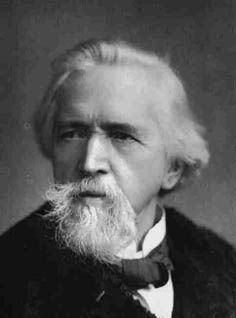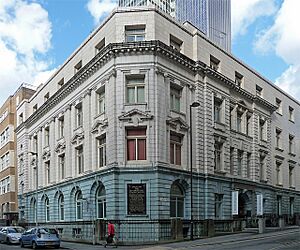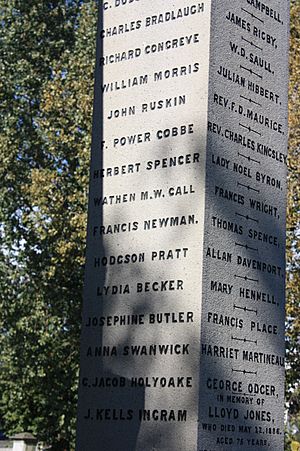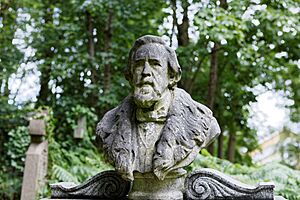George Holyoake facts for kids
Quick facts for kids
George Holyoake
|
|
|---|---|
 |
|
| Born |
George Jacob Holyoake
13 April 1817 Birmingham, Warwickshire, England
|
| Died | 22 January 1906 (aged 88) |
| Burial place | Highgate Cemetery, London |
| Occupation | Newspaper editor |
| Years active | 1846–1861 |
| Known for | Inventing the word secularism. |
| Spouse(s) | Eleanor Williams |
| Relatives | Austin Holyoake (brother) |
| Signature | |
George Jacob Holyoake (born April 13, 1817 – died January 22, 1906) was an important English writer and activist. He was known for his work in the co-operative movement and as a newspaper editor. He also created two well-known words: "secularism" in 1851 and "jingoism" in 1878. Holyoake edited a newspaper called the Reasoner for many years. He also worked on a co-operative newspaper, The English Leader.
Contents
Early Life and Learning
George Jacob Holyoake was born in Birmingham, England. His father was a metalworker, and his mother made buttons. George went to a small local school and a Sunday school.
When he was eight, he started working part-time at the same metal workshop as his father. He learned the trade there. At 18, he began attending talks at the Birmingham Mechanics' Institute. This was a place where working people could learn. There, he discovered the ideas of Robert Owen, a famous social reformer. Holyoake later became an assistant lecturer at the Institute.
In 1839, he married Eleanor Williams. He wanted to become a full-time teacher. However, his ideas about society, called socialism, meant he was not allowed to teach. So, Holyoake took a job as a speaker for Owen's ideas. He first worked in Worcester and then moved to Sheffield.
Developing New Ideas
Holyoake joined Charles Southwell in disagreeing with some rules of the Owenite movement. They did not want lecturers to take a religious oath to collect money on Sundays. Southwell started a newspaper that questioned religious beliefs, called Oracle of Reason. He was soon put in prison for his views.
Holyoake then took over as editor of the Oracle. His experiences led him to develop his own strong views on religion. He was also influenced by the French thinker Auguste Comte. Comte believed in using science to understand society. He even tried to create a non-religious "religion of humanity." Holyoake knew Harriet Martineau, who was an important writer and translator of Comte's work.
Fighting for Free Speech
In 1842, Holyoake gave a public talk in Cheltenham. During this talk, he answered a question in a way that led to him being charged with blasphemy. This meant speaking against religious ideas. He was one of the last people in Britain to be charged with this.
Supporters helped him avoid being walked in chains to prison. There was even a formal complaint made to the government, which was supported. People at his lecture voted that "free discussion was equally beneficial in the departments of politics, morals and religion." In 1842, Holyoake and another socialist, Emma Martin, started the Anti-Persecution Union. This group helped people who were arrested for sharing their ideas freely.
Holyoake was imprisoned for six months. After his release, he started a new, more moderate newspaper called The Movement. This paper lasted until 1845.
Creating Secularism
After The Movement, Holyoake started the Reasoner newspaper. Here, he developed the idea of secularism. This idea suggests that public life and government should be separate from religious beliefs. He later started the Secular Review in 1876.
Holyoake continued to believe that there was no God. But he felt the word "atheism" sounded too negative. He preferred the term "secularism" instead. Later, when the word "agnostic" appeared, he adopted that too. An agnostic is someone who believes we cannot know if God exists.
In the 1850s, Holyoake and Charles Southwell gave talks in East London. Harriet Law, who was a Baptist, began debating with them. Through these discussions, her own beliefs changed. She became a strong supporter of Holyoake and a well-known speaker for secular ideas.
In 1877, Holyoake, Charles Watts, and Harriet Law formed the British Secular Union. This happened after a disagreement with other leaders of the National Secular Society. Holyoake also led the Rationalist Press Association from 1899 to 1906.
Supporting the Co-operative Movement

In his later years, Holyoake spent most of his time working for the co-operative movement. This movement helps people work together to own and run businesses for their shared benefit. He was the President for the first day of the 1887 Co-operative Congress.
He wrote several books about the history of co-operation. These included a history of the Rochdale Pioneers (1857) and The History of Co-operation in England (1875). He also wrote his own life story, Sixty Years of an Agitator's Life (1892).
Holyoake passed away in Brighton, Sussex, on January 22, 1906. He was buried in Highgate Cemetery in London.
The Co-operative Movement decided to build a special building to remember him. This building, called Holyoake House, opened in 1911 in Manchester. It is now home to Co-operatives UK and the National Co-operative Archive.
Other Contributions
Holyoake also created the word "jingoism". He used it in a letter to The Daily News in 1878. He was talking about a popular patriotic song. He meant it to describe people who were too eager for war. He felt they did not truly represent the quiet strength of the British people.
Holyoake was the uncle of Horatio Bottomley, who later became a Member of Parliament. Holyoake helped pay for Bottomley's care after he became an orphan. The former Prime Minister of New Zealand, Keith Holyoake, was also related to him.
Memorials and Legacy
George Holyoake is remembered in several places. His name is on the Reformers' Memorial in London's Kensal Green Cemetery.
Holyoake House in Manchester has a special message on its side. It says he was "one of the pioneers of Co-operation who for nearly 70 years was a strenuous worker for liberty and reform."
In 2018, the National Secular Society placed a blue plaque in London to honor Holyoake. It is on a building at 4 Woburn Walk in Bloomsbury.
Several roads are also named after him. These include Holyoake Road in Headington, Oxford, Holyoake Walk in Ealing, London, and Holyoake Terrace in Penrith, Cumbria and Sevenoaks, Kent.
See also
- Thomas Aikenhead – the last person executed for blasphemy in Britain



